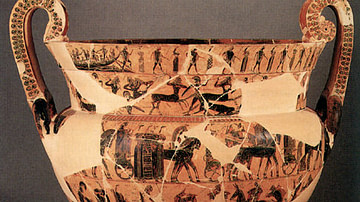Search Definitions
Browse Content (p. 272)

Definition
Ancient Egyptian Mythology
Egyptian mythology was the belief structure and underlying form of ancient Egyptian culture from at least c. 4000 BCE (as evidenced by burial practices and tomb paintings) to 30 BCE with the death of Cleopatra VII, the last ruler of the Ptolemaic...

Definition
Cicero
Marcus Tullius Cicero was a Roman orator, statesman, and writer. He was born on 3 January 106 BCE at either Arpinum or Sora, 70 miles south-east of Rome, in the Volscian mountains. His father was an affluent eques, and the family was distantly...

Definition
Antonine Wall
The Antonine Wall was the north-west frontier of the Roman Empire. Located in central Scotland, north of Edinburgh and Glasgow, the Wall was a linear barrier that stretched from the Firth of Forth near Bo'ness to the Clyde estuary at Old...

Definition
Ancient Egyptian Culture
Ancient Egyptian culture flourished between c. 6000 BCE with the rise of technology (as evidenced in the glasswork of faience) and 30 BCE with the death of Cleopatra VII, the last Ptolemaic ruler of Egypt. It is famous today for the great...

Definition
Greek Architecture
Greek architecture is concerned with simplicity, proportion, perspective, and harmony in buildings. Greek architecture includes some of the finest and most distinctive buildings ever built. Examples of Greek architecture include temples...

Definition
Ancient Greek Music
Music (or mousike) was an integral part of life in the ancient Greek world, and the term covered not only music but also dance, lyrics, and the performance of poetry. A wide range of instruments was used to perform music which was played...

Definition
Odysseus
Odysseus (Roman name: Ulysses) was one of the great pan-Hellenic heroes of Greek mythology. He was famous for his courage, intelligence, and leadership. Odysseus' resourcefulness and oratory skills were instrumental in the Greek victory in...

Definition
Triumphal Arch - A Roman Exercise in Architectural Vanity
The triumphal arch was a type of Roman architectural monument built all over the empire to commemorate military triumphs and other significant events such as the accession of a new emperor. Celebrated surviving examples of triumphal arches...

Definition
Sextus Julius Caesar
Sextus Julius Caesar (died 90 or 89 BCE) was Roman politician in the first quarter of the first century BCE. In our sources, he is sometimes called Lucius. The end of the second century BCE witnessed the rise of new families in Roman politics...

Definition
François Vase
The François Vase is a large Attic volute-krater dating to c. 570-565 BCE, and it is perhaps the example par excellence of the black-figure pottery style. An astonishing range of scenes and characters from Greek mythology cover the vase and...